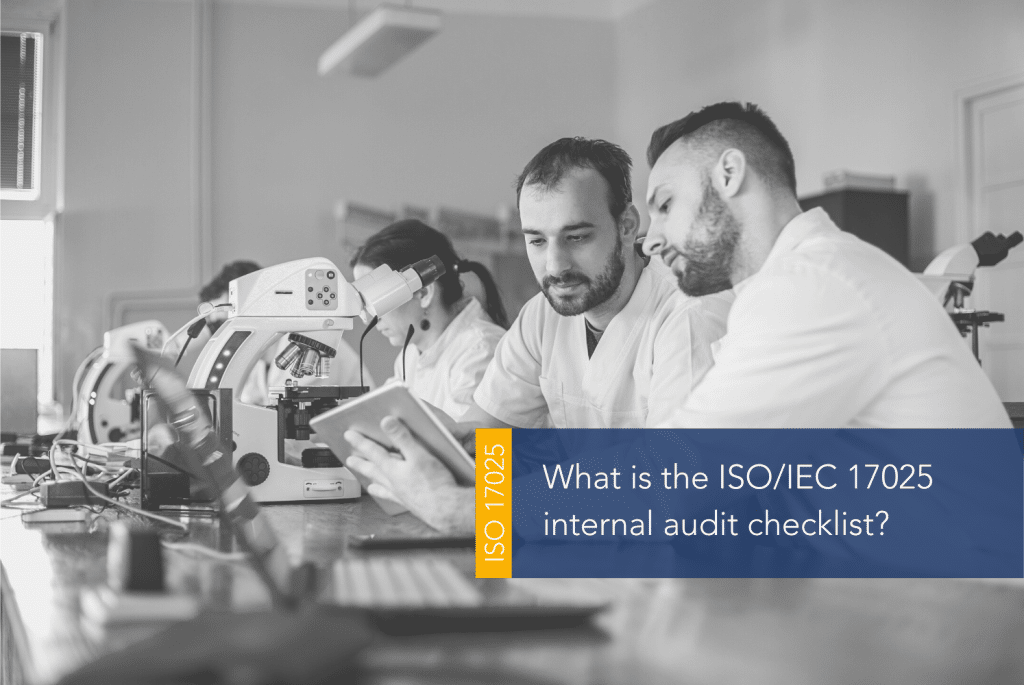
What is the ISO/IEC 17025 internal audit checklist?
May 29th, 2023 By AmywrightThis article will discuss the ISO/IEC 17025 internal audit checklist, including what is covered by the list and how it assists with internal auditing.
What is ISO/IEC 17025?
ISO/IEC 17025 is an international standard that specifies the requirements for the competence of testing and calibration laboratories.
It provides a framework for laboratories to establish and maintain a quality management system that ensures their testing and calibration results’ accuracy, reliability, and consistency. Compliance with ISO/IEC 17025 is often required by regulatory bodies, accreditation bodies, and customers to demonstrate a laboratory’s technical competence and reliability.
The ISO/IEC 17025 standard covers all aspects of laboratory management, including personnel competence, equipment calibration and maintenance, sample handling, testing procedures, and reporting of results. The standard is widely recognised as a mark of quality and competence in the laboratory industry.
What is the ISO/IEC 17025 internal audit checklist?
The ISO/IEC 17025 checklist is a detailed document used by laboratories to assess their compliance with ISO/IEC 17025 requirements. This document provides a list of the requirements of ISO/IEC 17025. It helps guide auditors through the laboratory’s processes so that they can assess their compliance with these requirements.
The ISO/IEC 17025 internal audit checklist typically includes a list of questions and tasks that must be completed during the audit process.
An audit checklist is a valuable tool for identifying areas where improvements are needed and can be used in preparation for external or internal audits, which will help demonstrate a company’s compliance with ISO to customers and stakeholders.
What is covered in the ISO/IEC 17025 checklist?
Multiple criteria are covered in the ISO/IEC 17025 internal audit checklist to ensure compliance with the requirements of the standards, including the following:
Sampling: Addresses the requirements for sample selection, handling, and preparation. Are sampling procedures documented and followed? Are samples adequately handled, stored, and disposed of?
Testing procedures: Addresses whether testing procedures are documented, validated, and followed. Are testing results accurate, reliable, and appropriately reported?
Records: Are records correctly documented and maintained? Are records secure and confidential?
Corrective actions: Are corrective actions taken when non-conformities, including the methods and procedures used?
Terms and definitions: Provides definitions of key terms used in the standard.
Organisation and management: Covers topics such as the laboratory’s organisational structure, roles and responsibilities, document control, and quality system implementation.
Personnel: Addresses the requirements for the competence and training of laboratory personnel.
Accommodation and environmental conditions: Covers the laboratory’s physical facilities, equipment, and environmental conditions required for proper testing and calibration.
Equipment: Addresses the calibration and maintenance requirements for laboratory equipment.
Metrological traceability: Covers the requirements for establishing the traceability of measurement results.
Handling of test and calibration items: Covers the requirements for receiving, transporting, and storing samples and equipment.
Assuring the quality of test and calibration results: Addresses the requirements for monitoring the quality of testing and calibration results.
Reporting the results: Covers the requirements for reporting testing and calibration results and maintaining records.
Validity of results: Addresses the requirements for ensuring the validity and accuracy of testing and calibration results.
Complaints: Addresses the procedures for handling complaints.
Non-conforming work: Covers the requirements for identifying and addressing non-conforming work.
Control of data and information management: Addresses data management and confidentiality requirements.
Internal audits: Covers the requirements for conducting internal audits of the laboratory’s quality system.
Management reviews: Addresses the requirements for conducting management reviews of the laboratory’s quality system.
It’s important to note that the specific requirements of the checklist may vary depending on the laboratory’s scope of accreditation and the accrediting body’s requirements.
I’m interested in ISO/IEC 17025; what happens next?
If you are interested in ISO/IEC 17025, you can contact one of our ISO specialists today, and they will advise you step by step on your journey to implementing ISO/IEC 17025.
At IMSM, we make the process of earning certification simple. We provide a fixed-fee and flexible approach with professional consultation services.

Contact Us
For a free Quotation or Remote presentation by an ISO Specialist, contact us today!
IMSM Ltd Head Office
The Gig House
Oxford Street
Malmesbury
Wiltshire
SN16 9AX